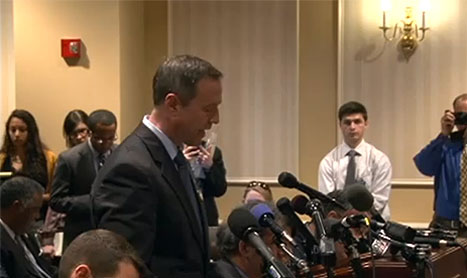ANNAPOLIS – In testimony before a Senate committee Tuesday, Gov. Martin O’Malley stressed the importance of balancing the freedom of Maryland’s religious institutions to practice their faith with the civil rights of same-sex couples in the state.
“As a free and diverse people of many faiths, we choose to be governed under the law by certain fundamental principles or beliefs, among them the belief we share in the dignity of every individual, a belief we share in equal protection of the law for every individual, and the belief in the free exercise of religion without government interference,” he said to a committee room packed with supporters and opponents of the bill, one of the most controversial this session.
O’Malley hopes the Civil Marriage Protection Act, introduced last week, will pass both chambers of the General Assembly this spring. An earlier version stalled last year after it failed to pick up the 71 votes necessary to pass in the House.
Video by Whitney Harris/CNS-TV
O’Malley’s testimony before the Senate Judicial Proceedings Committee drew on themes of equality, freedom and dignity for all Marylanders. It also included assurances that the state would not impinge on the rights of religious institutions that see marriage as strictly between a man and a woman.
This year’s bill includes more explicit language exempting religious organizations from having to perform same-sex nuptials.
“The very reason, in fact, for our state’s founding was for religious freedom, and a part of religious freedom is respect for the freedom of individual conscience,” said O’Malley, who rarely testifies on legislation before the assembly. “The way forward, the way that we sustain and enhance our common life together, is through equal respect for the freedom of all.”
O’Malley highlighted the impact the bill would have on Maryland families.
“It’s not right and it is not just that the children of gay couples should have lesser protection than the children of other families in our state,” he said.
Sen. Richard Madaleno, D-Montgomery, who is openly gay, testified about the impact the bill would have on his own family, as well as those across the state. He and his partner have children they adopted as a couple.
“There are lots of different families in our state, and this is simply a bill to ask for that recognition that all families have the same protections, the same obligations, the same duties that are necessary in order to make that family last for the long haul,” Madaleno said.

Opponents of the bill argued that marriage is an institution with deep religious and cultural implications that should not be altered by the state.
“I believe there is one fact that is undeniable: that none of us would be here had it not been for one woman and one man,” testified the Rev. Joel Peebles, assistant pastor at Jericho City of Praise in Landover.
“We do not fight against anyone. We do not come here to hurt. We stand here today to celebrate marriage,” he said.
More than 100 people, many wearing buttons, stickers and T-shirts announcing their position on same-sex marriage, lined up outside the committee room before the meeting to testify for or against the bill. An overflow room had to be opened downstairs to accommodate the crowd.
Corrogan Vaughn and Sue Payne sat together on a couch outside the committee room, waiting for their turn to testify.
Both wore buttons that said “PROUD TO BE A COWARD,” in reference to Maryland First Lady and Judge Katie O’Malley’s remark last Thursday to a conference of gay-rights advocates that last session’s same-sex marriage bill failed due to “some cowards that prevented it from passing.” O’Malley apologized for her comment the next day.
Vaughn and Payne oppose the bill, but for different reasons.
Vaughn, of Pikesville, said the issue for him was government regulation of private life.
“Government cannot legislate a sacrament which is a sacrament in just about every faith,” he said. “I think the government needs to stay out of our bedrooms, our boardrooms, our bathrooms, our delivery rooms, and leave all of it alone.”
Payne, of Damascus, said she did not oppose same-sex marriage on principle – she just wanted an even playing field for everyone.
“Everything ought to be equal. This bill makes one group more equal than another, and the traditionally married couple becomes unequal,” she said.
She argued that same-sex married couples would enjoy benefits that heterosexual married couples would not, since they could file federal income taxes as singles, rather than as a married couple, without any penalties.
On the other side of the room, Karen Coyne and Wendy Kridel, both of Baltimore, rehearsed their testimony in favor of the bill. They have been a couple for 17 years, have adult children and said they would marry if the bill is passed.
“We’d like to just be able to live with a sigh of relief,” Coyne said. “Our life together is very meaningful. We do a lot of good, we have good lives, but we’d like to know that we’re protected under the law.”


You must be logged in to post a comment.